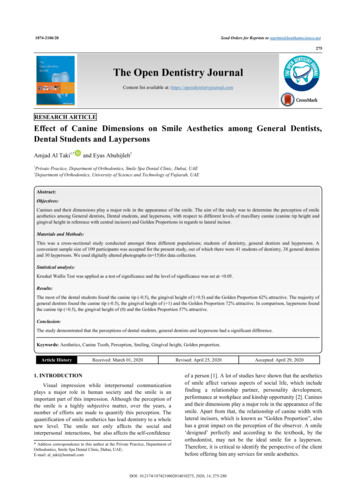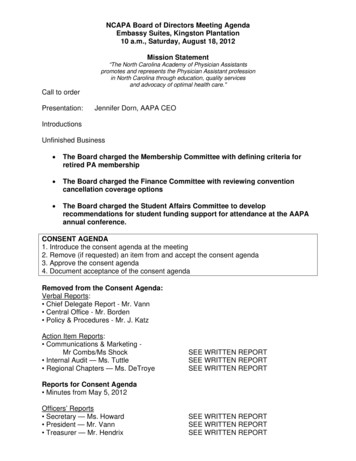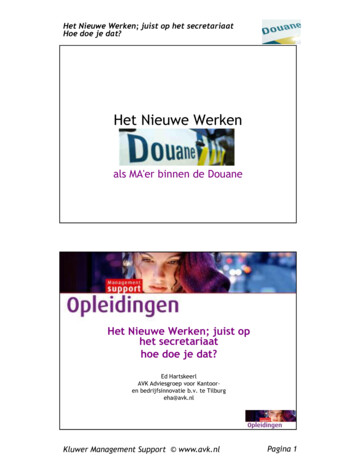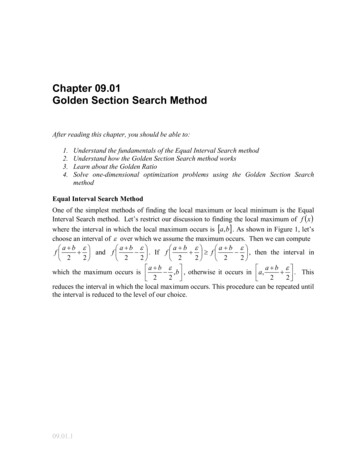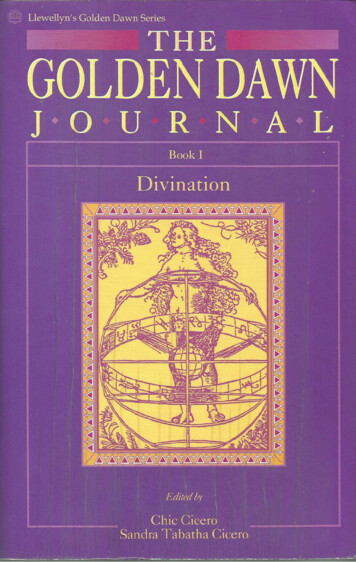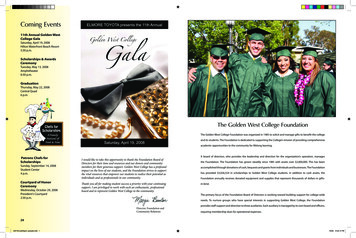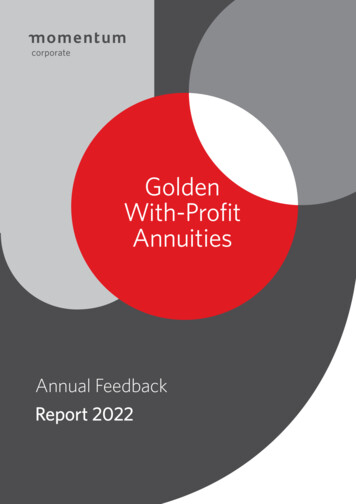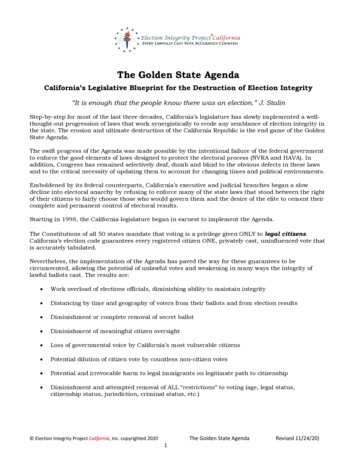
Transcription
The Golden State AgendaCalifornia’s Legislative Blueprint for the Destruction of Election Integrity“It is enough that the people know there was an election.” J. StalinStep-by-step for most of the last three decades, California’s legislature has slowly implemented a wellthought-out progression of laws that work synergistically to erode any semblance of election integrity inthe state. The erosion and ultimate destruction of the California Republic is the end game of the GoldenState Agenda.The swift progress of the Agenda was made possible by the intentional failure of the federal governmentto enforce the good elements of laws designed to protect the electoral process (NVRA and HAVA). Inaddition, Congress has remained selectively deaf, dumb and blind to the obvious defects in these lawsand to the critical necessity of updating them to account for changing times and political environments.Emboldened by its federal counterparts, California’s executive and judicial branches began a slowdecline into electoral anarchy by refusing to enforce many of the state laws that stood between the rightof their citizens to fairly choose those who would govern them and the desire of the elite to cement theircomplete and permanent control of electoral results.Starting in 1998, the California legislature began in earnest to implement the Agenda.The Constitutions of all 50 states mandate that voting is a privilege given ONLY to legal citizens.California’s election code guarantees every registered citizen ONE, privately cast, uninfluenced vote thatis accurately tabulated.Nevertheless, the implementation of the Agenda has paved the way for these guarantees to becircumvented, allowing the potential of unlawful votes and weakening in many ways the integrity oflawful ballots cast. The results are: Work overload of elections officials, diminishing ability to maintain integrity Distancing by time and geography of voters from their ballots and from election results Diminishment or complete removal of secret ballot Diminishment of meaningful citizen oversight Loss of governmental voice by California’s most vulnerable citizens Potential dilution of citizen vote by countless non-citizen votes Potential and irrevocable harm to legal immigrants on legitimate path to citizenship Diminishment and attempted removal of ALL “restrictions” to voting (age, legal status,citizenship status, jurisdiction, criminal status, etc.) Election Integrity Project California, Inc. copyrighted 20201The Golden State AgendaRevised 11/24/20)
FEDERAL LAWS1994National Voter Registration Act (NVRA) requires all people interacting with state or federalgovernment agencies to be offered a voter registration form Increased easy access of non-citizens to voter rolls through the DMVoCA’s issuance of licenses to undocumented immigrants starting in 2015 increases theiraccess to voter rollsoFurther access to voter rolls was given to all non-citizens through Obamacare (CoveredCalifornia) and the extension of social services such as welfare, social security, healthcare and food stamps to non-citizens, including the undocumented NVRA and CNVRA (CA’s version of NVRA) – requires no verification of citizenship NVRA (Section 8) requires voter roll maintenanceoSince 1993 special dispensation to CA by Clinton DOJ, CA has been free of this mandateo2019--EIPCa wins settlement that re-establishes mandate for CA2002Help America Vote Act (HAVA) requires top down, statewide voter database; provisional ballot CA came into “compliance” with the statewide database mandate in 2016, the last state to doso. Concerns remain:Ø the manner in which the contract was awarded (no-bid, non-competitive award)Ø the poor reputation of the company awarded the contractØ the lack of public transparency with regard to the database certificationØ EIPCa revelations of serious and potentially disqualifying defects in the database(continuing as of September, 2020) CA expands use of provisional ballot beyond all reasonable boundariesØ Laws regarding provisional ballots are unenforcedØ SOS “advisories” suggest subversion of the law (turn no one away, give everyone aprovisional ballot), a practice that overwhelms the system with excess numbers ofprovisional ballots and increases the chances that unlawful ballots may be counted; italso leads voters whose ballots cannot be counted to believe they have votedØ Voters are disenfranchised by ignorantly casting ballots not tailored to their ownprecinct, because elections officials either do not know or ignore the consequencesØ Out-of-county voters are allowed to vote without being informed that their ballot cannotbe counted Election Integrity Project California, Inc. copyrighted 20202The Golden State AgendaRevised 11/24/20)
Ø Counties are inundated with ballots that are time- and labor-intensive, and subject toerrors in duplicating. (remaking) and counting (CA cast 70% of the nation’s provisionalballots in 2018)CALIFORNIA LAWS1998CA eliminates the Absentee Ballot; converts to no-excuse, permanent vote-by-mail TWO Presidential Commissions (2001 and 2005) have determined that vote-by-mail ballots donot satisfy FIVE requirements for fair and honest elections, and facilitate election manipulationand fraud 20 years of unabated effort to get ALL voters to vote by mail (now approximately 75% of votersreceive permanent mail-in ballot. In many cases, this was NOT the voter’s choice: mandatedprecincts; DMV registration changes; unexplained changes; county adoption of Voters ChoiceAct)2011CA passes SB 397, online voter registration. Though implementation was not supposed to trigger until CA was in compliance with the HAVAmandate for a statewide voter database (which did not happen until 2016), online registrationbegan in September of 2012, one month before the registration deadline for the Novemberelection. In that one month, 6,080 duplicate registrations resulted, potentially affecting theintegrity of the 2012 election.2012CA “Top Two Primary” (Prop 14) goes into effect Moves CA into operation as a Democracy rather than as a Republic. Article 4, Section 4 of theU.S. Constitution states that “The United States shall guarantee to every State in this Union arepublican form of Government.” The rights of those of minority opinion or affiliation, whichare protected in a republic, are no longer protected in CA, because under the Top Two Primarysystem, voters affiliated with political parties other than the major two will never have acandidate reflective of their values on the General Election ballot, and this situation is verylikely to result in voter suppression. Voters approved the proposition largely because of deceptive, large-money media campaignand misleading ballot title2013CA passes AB 817, enabling non-citizens to be poll workers There are “qualifications” stipulated in the law, but no way to verify that poll workers meetthose qualifications Observers report that many do not speak or understand English, which is a mandatoryrequirement for poll working. In some polls, EIPCa observers documented that not a single pollworker could assist an English-speaking voter. Non-citizens cannot legally take the poll worker oath because they have not Election Integrity Project California, Inc. copyrighted 20203The Golden State AgendaRevised 11/24/20)
Ørelinquished allegiance to their native countryØrelinquished allegiance to their foreign leadersØsworn allegiance to the United States Facilitates foreign intervention2014California begins issuing driver licenses to non-citizens—direct path to voter registration CA elections officials, up to and including the SOS, are barred from accessing DMV and DHSinformation regarding non-citizens and illegal aliens; no way to ascertain citizenship status ofregistrant other than self-identificationCA passes bill allowing Vote-by-Mail ballots to arrive up to 3 days late even without a postmarkMany counties cleared to do all Vote-by-Mail elections for special elections2015CA passes AB 1461: voter registration becomes automatic through DMV with an opt-out process Registration is automatic through DMV interaction unless voter proactively requests not to beregistered Given the ease of voter impersonation and ballot harvesting in CA, this multipliesexponentially the opportunity for undetectable fraudulent voting Non-citizens WILL become registered with or without their knowledge—this inevitability isadmitted in the text of the law itself AB 1461 exculpates any non-citizen who becomes registered and/or votes by requiring DAs toprove intent to commit fraud.o NOTE: immigrants legally here and on path to citizenship may become registeredwithout their knowledge or permission; upon applying for citizenship, they will befound guilty of a felony, denied citizenship and deportedDMV requires proof of citizenship and residency before issuing a license but impossibility ofproper training, supervision and oversight of so many DVM clerks opens the door to countlessnoncitizens becoming registered to vote; the law specifically states that the DMV is NOTrequired or expected to determine eligibility for voter registration and votingo2018--DMV admits to clerical errors affecting over 105,000 registrants within monthsafter implementation. Errors include incorrect recording of party affiliation and desiredvoting method and 1,600 registered despite requested opt-out, creating duplicates andunlawful registrations; DMV admits that some non-citizens are erroneously registered.oThe DMV process becomes a great source of registration error due to voters who are notcomputer savvy, as the software is complicated and the default is “permanent vote-bymail” and “decline to state” party affiliation. Because of state party rules, this situationdisenfranchised unsuspecting Republicans from participating in that party’spresidential primary in 2016 and 2020.AB 1461 allows pre-registration of 16- and 17-year-olds with the promise they won’t beactivated until their 18th birthday Election Integrity Project California, Inc. copyrighted 20204The Golden State AgendaRevised 11/24/20)
Ø Reports to EIPCa are that minors are showing up on the active voter rollsØ Labor-intensive for ROVs since it is highly unlikely that residency information of 16-17year-olds will remain consistent for the next two yearsØ High schools hold registration drives on campus, conducted by untrained individuals.Allows vulnerable teens to be shepherded into teacher-suggested party affiliation andselection of permanent vote-by-mail status, making their votes more susceptible tomanipulation and error. Also hurts many students who are non-citizens but who becomeregistered due to ignorance or peer group pressure, and thus they forfeit any qualificationfor future citizenship.CA passes bill to allow 8 additional days after ballot receipt for voters to provide a missingsignature or “cure” nonmatching signature on a VBM ballot Prevents fewer ballots to be rejected erroneously, BUT the time and labor needed to send a ballotthrough the curing process may act as an incentive to approve more questionable signaturesrather than research them with the voter. Result: enables more mail ballot fraud. Elections officials immediately controverted the time limit of the law, and continued sendingballots to “cure” up until the date of certification.2015EIP research and documentation triggers hearing by CA Advisory Committee to the U.S.Commission on Civil Rights Full day testimony of citizens from all over the state Documentation signed under penalty of perjury by EIP volunteers Evidence that the civil rights of all CA citizens are being violated Testimony focused on chaos and unlawful behavior of LA County ROV and poll workers The Regional Director stated that citizen testimony and documentation were extremelytroubling, and that similar hearings should be held in other statesØ Regional Director removed during process of writing report with recommendationsØ His replacement never visited CA and was later was removed from the positionØ The required report was delayed, heavily redacted and generalized so that damagingspecific testimony was not included, and the entire report was buried entirely for quitesome time. (Redacted report finally resurfaced in July, 2017 and was dismissed by thenational Commission.)2016CA passes SB 450, the “Voter’s Choice Act” In light of California’s lack of voter roll maintenance, essentially facilitates election chaos andauthorizes counties to greatly complicate and make inconvenient the right to vote in person. Incounties that elect to accept the VCA: Eliminates neighborhood precinct voting Sends mail ballot to every registered voter Election Integrity Project California, Inc. copyrighted 20205The Golden State AgendaRevised 11/24/20)
The 5 pilot counties that implemented in 2018 indicated that they had done so too soon andwere therefore less prepared than they should have been; many ballots mishandled, andelection results questionable. Because voters in the 5 pilot counties were not properly educated as to their options forvoting (right to vote in person), Vote Centers were sparsly used for in-person voting, butbecame overwhelmed on Election Day as excessive numbers of voters dropped off theirballots; ballot security was jeopardized as ballot containers became full to overflowing.CA passes bill allowing voters to photograph their voted ballot and post the photo on socialmedia enables; voter intimidation and vote selling; no legitimate purposeCA passes bill allowing voters to submit their mail ballots to polling places anywhere in thestate, requiring already heavily burdened ROVs to find and forward those ballots to the propercounty within 8 days This extends the time ROVs have to count last minute mail ballots, thus severely shorteningthe time to process an ever-growing number of provisional ballotsCA passes AB 1921 allowing unlimited number of mail ballots to be turned in by anyone,regardless of relationship to voter eliminates chain of custody and legalizes wholesale ballot harvesting prohibited in mostother states, and considered a felony in many. Prohibits disqualifying a ballot solely because the person returning it did not providename, relationship to the voter or signature (i.e. did not follow the law). Facilitates voter intimidation, harassment, vote selling, manipulation of vulnerablepopulations and more. Documentation in 2018 and 2020 bears out the validity of theseconcerns.NOTE: In the June 7, 2016 primary election there emerged several troubling patterns statewide thatresulted in a huge spike in Provisional Ballot use: Voters’ party affiliation changed without their permission or knowledge Voters who requested party change before registration deadline found their request was notprocessed Disturbing spike in Vote-by-Mail voters not receiving their ballots Disturbing spike in voters changed to Vote-by-Mail without their request or knowledge, andnot receiving ballot in mail—result: potential illegal ballot harvesting and disenfranchisementFURTHER NOTE: the last two situations mentioned have been growing in number in each electionsince our research began in 2012; a new spike was reached in November, 20182017CA passes further laws that erode election integrity in an environment where ID is not required: Voters no longer have to state name and address aloud and have it repeated when voting inperson; they now only need to “provide” name and address, further facilitating voterimpersonation Election Integrity Project California, Inc. copyrighted 20206The Golden State AgendaRevised 11/24/20)
Voters are no longer required to write their address, further facilitating voter impersonation Long-standing California law requires polling location to post voter list for public viewing; listcontains name, address and party affiliation; those who have voted must be crossed off onceevery hour. This greatly facilitates voter impersonation2018CA passes law implemented in November election under urgency clause requiring counties tocontact all voters whose mail ballots are considered for rejection so they can “cure” their vote While this law could potentially keep voters from being disenfranchised due to faulty signaturerejection, there are significant “unintended” consequences(verification by voter is done by downloading a form online or responding with a form sent in themail—voter may never see original ballot and may “verify” a fraudulent signature)Ø County officials, already pressed by certification deadline, and overwhelmed withmounting numbers of mail, conditional and provisional ballots—all time and laborintensive, will not have the time or personnel to accomplish nor process voter outreach.This will inevitably lead to looser standards of signature match (already extremely liberal)and thus the counting of untold numbers of fraudulent ballotsØ Though the law limits this practice to a period of 8 days after receipt (potentially 16 daysafter Election Day), SOS Padilla issued an advisory in November 2018 that the practicecan and should continue up to the date of certificationCA passes AB 216, establishing Vote-by-mail ballots as postage paid. Because of the preponderance of community drop boxes and ability for voters to authorizesomeone else to submit their ballot, the state’s incurring this expense was completelyunnecessary. The law also provides subtle incentive for voters to use USPS (2nd least safe way to submit aVBM ballot)CA passes AB 306, allowing harvested ballots to be counted without documentation of chain ofcustody.2019CA passes AB 963, instituting complex programs on college and university campuses with thegoal of increasing registration and voting by all students. While the surface purpose of encouraging voter participation of the 18-25-year-old age group isgood, this mandatory program is highly expensive and has the very real potential of removing thestudents’ right to CHOOSE if and how to engage in civic affairs. It also has great potential for:opartisan indoctrination and intimidationofacilitating registration and voting by ineligible individualsojeopardizing of student funding status (cancellation of scholarships and other fundingwhen official state of residence is changed)oderailing legal immigrants’ path to citizenshipCA passes AB 1036, instituting a complex pilot program on certain high-school campusessimilar to the one implemented on college and university campuses by AB 963. Election Integrity Project California, Inc. copyrighted 2020The Golden State AgendaRevised 11/24/20)7
While the surface purpose of educating teens with respect to civic engagement is good, thismandatory program has the same negatives as its university counterpart listed above,CA passes SB 72, mandating Conditional Voter Registration (“same day registration”) in allpolling locations Puts undertrained, under-supervised and at times overwhelmed poll workers in a position to dogreat harm by making errors and allowing non-provisional ballots to be cast by ineligible voters.CA passes SB 212, allowing school board elections to use rank-choice voting Sets up potential for the top vote getters to be declared the losers, which may create confusion,mistrust and ultimate apathy in the voting population This lets the camel’s nose under the tent, and rank-choice voting may spread to other electedoffices, magnifying the effect stated above.CA passes SB 523, extending the “curing” process to two days before certification. While the surface intention of preventing disenfranchisement of eligible voters is good, thisextension will intertwine the processing of vote-by-mail and provisional ballots, and potentiallyfacilitate the counting of fraudulent ballots while the voter’s response is pending. The concern still exists that the time and labor needed to send a ballot through the curingprocess may act as an incentive to approve more questionable signatures rather than researchthem with the voter. Result: enables more mail ballot fraud. Pressure on elections officials to finalize election results acts as a disincentive to lengthen theprocess through waiting for a “cure”; officials will feel pressured to accept signatures withoutchallenge to meet deadlines.CA passes “same day” registration without provisional ballot if registration location has access toVoteCal to “verify” registrants’ eligibility Since VoteCal is not yet a reliable database, this bill facilitates the casting and counting ofillegitimate or duplicate ballots Creates confusion of voters and poll workers in the polls2020CA passes SB 207 as an urgency bill, allowing voters to change party affiliation and otherregistration information at the moment of voting without having to fully re-register. This is primarily a “band-aid” designed to mitigate the voter roll chaos caused by AB 1461 (NewMotor Voter.) Instead of suspending, rethinking and repairing the bill, the legislature andgovernor provide this “instant fix” in an attempt to calm voter frustration while allowing theunderlying problem to continue. Certain VBM voters will be disenfranchised because of their inability to make an in-person, lastminute “repair” to their registration. This bill circumvents the prerogative of each political party to minimize external interference intheir presidential candidate nomination process. The perceived protections intended by declaringa “closed primary” are completely irrelevant under this law. Election Integrity Project California, Inc. copyrighted 20208The Golden State AgendaRevised 11/24/20)
This bill was passed and signed long after poll worker training materials were prepared andprinted, so poll workers for the 2020 presidential primary were ill-prepared to process this hugechange in procedure. The bill does not designate any procedure for implementation, leaving each county to create onthe fly its best understanding of how to incorporate the dictates of this new law. The result iscomplete inconsistency in voter experience throughout the state.CA passes ACA 6, (approved as Proposition 17 in November 2020) restoring the franchise tofelons during their period of parole. Felons rely on the good graces of their parole officer for their continued freedom, and aretherefore subject to potential undue influence. Approximately 50% of parolees re-offend within the period of their parole. This law enfranchisesindividuals who have not yet proven their ability and willingness to commit to the socialcontract. NOTE: California’s prison reforms and realignments over the last decade have reclassified manyfelonies such that sentences for all but the most heinous of felonies (murder, rape, child sexualabuse, human trafficking, etc.) are served in jail rather than in prison. All jailed offenders of anysort retain their franchise during their confinement and they are not subject to a parolerequirement. This in itself is highly problematic, subjecting this vulnerable population topotential undue peer-group or supervisor pressure, influence and intimidation, from registrationthrough mail ballot marking and posting. NOTE: Proponents won this argument with voters largely by playing the race card, and byquoting certain studies that do not disaggregate behavior of different levels of offenders.CA passes ACA 4, proposing enfranchising 17-year-olds for a primary election if they will be 18 bythe date of the corresponding general election. ACA 4 became Proposition 18 on the November2020 ballot, and was soundly rejected by California voters. This proposed constitutional change was a blatant attempt to enfranchise yet anotherpopulation highly vulnerable to undue institutional influence. It failed this time, but there isalready another effort in that direction proposed by the legislature.CA passes AB 860, urgency legislation propelled by COVID concerns, mandating that all activeregistered voters be sent a vote-by-mail ballot. Valid for November 2020 only. This law fails to address the chaos and un-accounted-for ballots that will be generated by thedeplorable condition of the VoteCal database. Conservatively, approximately one-half million ballots will be sent to the last-known address of“voters” who have been unreachable for at least 12 years, and most for decades longer. All ofthese ballots are ripe for abuse. Voters who do not normally get a ballot by mail will be confused, angry or upset, just as theywere in the recent special election held, at the last minute, by mail. Some of these voters wereand will be disenfranchised by not knowing how to vote in person. In-person voting is still to be facilitated, but will be much less convenient (see SB 423 below). Ballots postmarked by Election Day may arrive up to 17 days after Election Day and be counted.Eligibility of allots with missing or illegible postmark will be determined by the date provided bythe voter! Election Integrity Project California, Inc. copyrighted 20209The Golden State AgendaRevised 11/24/20)
CA passes SB 423, urgency legislation allowing consolidating of polling locations at countydiscretion, with polls open 4 days. Along with AB 860, fundamentally changes the voting process at the last minute for a vastnumber of voters. Communicating these changes to the entirety of the CA population will beimpossible. Very unwise in such a contentious presidential election year. Gives permission to consolidate precincts at the ratio of 10 precincts to 1 polling location.Normal election ratio is 1:1. Getting to the polls will require often inconvenient travel. Locationsmay be crowded, discouraging voters from voting in the safest manner.CA passes SB 423, urgency legislation allowing consolidating of polling locations at countydiscretion, with polls open 4 days.On September 28, 2020, CA Secretary of State announces an emergency rulemaking actionregarding signature verification ballot processing and counting. Some elements of these regulations appear to be overstepping executive authority by putting intoplace practices that either supersede previously legislated CA law or establish new elements ofthe election code, which is the sole purview of the legislative body.As a final blow, CA counties followed the executive over-reach of the governor and imposed, inthe name of COVID protection, restrictions on observer rights such that meaningful citizenoversight was effectively nullified. These policy restrictions illegally and unconstitutionally overrode observer rights as codified in CA election codes §§ 2300 (9a,b)-(10) and 15100 – 15105without legislative action.PROPOSED LAWS IN THE WAITING: Voter registration drives in penal and juvenile detention institutions restoring voting rights to all incarcerated felons Lowering voting age to 17 Lowering voting age to 16 Pre-registration at age 14Clearly the Golden State Agenda is gaining momentum, and is firmly aimed at maximizing both themanipulation of vulnerable populations (youth, criminals, non-citizens) and the chaos, lack of electionsecurity and inaccuracy of potential electoral results engendered by the widespread (quickly becominguniversal) vote-by-mail process. Essential to the Agenda’s success is the crippling of citizen oversight.This Agenda has been so successful in manipulating California elections that it is serving as a blueprint for Progressive take-over of all other states. Fear-mongering in the face of COVID-19 has put theprogress into warp drive. Election Integrity Project California, Inc. copyrighted 202010The Golden State AgendaRevised 11/24/20)
Ø The required report was delayed, heavily redacted and generalized so that damaging specific testimony was not included, and the entire report was buried entirely for quite some time. (Redacted report finally resurfaced in July, 2017 and was dismissed by the national Commission.) 2016 CA passes SB 450, the "Voter's Choice Act"



